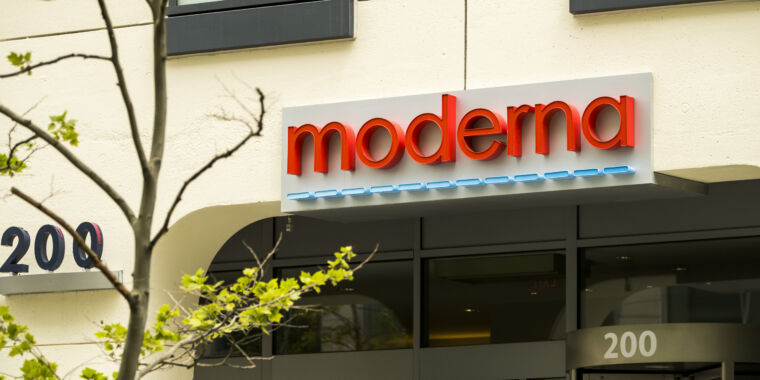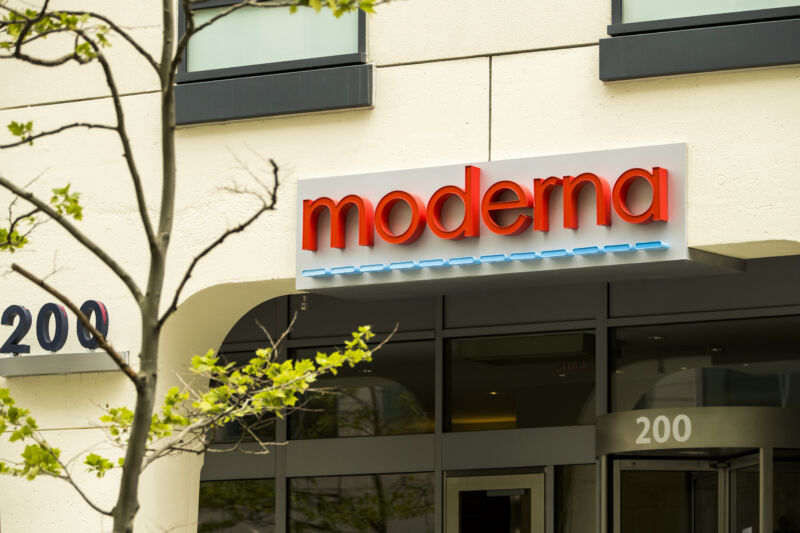

In a move highly anticipated by parents the country over, Moderna announced Thursday that it has requested FDA authorization for its two-dose COVID-19 vaccines for children 6 months to 2 years, and 2 years to under 6 years.
If the Food and Drug Administration issues an emergency use authorization (EUA) for the vaccines, they will be the first such vaccines available to the age groups in the now nearly two-and-a-half-year-long pandemic. Parents of young, vaccine-ineligible children have been anxiously awaiting the availability of such vaccines, particularly as much of the country tries to move on from the pandemic even as the number of cases of the extremely contagious omicron subvariants continue to tick upward.
“We are proud to share that we have initiated our EUA submission for authorization for our COVID-19 vaccine for young children,” Moderna CEO Stéphane Bancel said in a statement Thursday morning. “We believe mRNA-1273 [the COVID-19 vaccine] will be able to safely protect these children against SARS-CoV-2, which is so important in our continued fight against COVID-19 and will be especially welcomed by parents and caregivers.”
In March, Moderna announced top-line clinical trial results that the vaccines for the two young age groups met their primary goals in the trial: They both prompted high levels of neutralizing antibodies that matched or exceeded the levels seen in adults ages 18 to 25, which correspond with established effectiveness.
Because the trial was ongoing during the towering omicron wave, Moderna was also able to roughly calculate vaccine effectiveness against infection, though the trial wasn’t primarily designed to do so. As expected when up against the omicron variant—which can evade vaccine-derived immunity—the vaccines appeared approximately 44 percent effective in children 6 months to 2 years, and 37.5 percent effective in those 2 years to under 6 years.
Omicron rollercoaster
In the announcement today, Moderna noted that those efficacy estimates included results from home COVID-19 testing. When they instead only included COVID-19 cases confirmed positive by laboratory RT-PCR testing, the efficacy improved slightly for infants, rising to 51 percent (with a 95 percent confidence interval of 21 to 69) for 6 months to 2 years. For children 2 years to under 6 years, the efficacy estimate remained at 37 percent (with a 95 percent confidence interval of 13 to 54).
“These efficacy estimates are similar to vaccine efficacy estimates in adults against Omicron after two doses of mRNA-1273 [vaccine],” the company noted.
Now that the submission is with the FDA, parents will likely be keenly watching how the regulator handles the submission. Last week, Politico reported that FDA officials are considering delaying review of Modern’s submission as it awaits data from Pfizer and BioNTech on their vaccine for young children. The officials reportedly think that it would be “less confusing” if the two vaccine options were made available to parents at the same time. Top infectious disease expert Anthony Fauci later confirmed that the FDA is considering waiting until summer, likely June, to review and authorize the vaccines.
Pfizer and BioNTech’s vaccine for children under age 5 has been a rollercoaster, starting in December when the companies announced that two doses did not meet the primary goal of generating antibody levels in young children comparable to levels seen in adults. The companies are now testing a third dose, the data on which is expected in June.
Massive impact
Parents and other experts have been critical of plans to delay review of Moderna’s vaccines. That includes former FDA commissioner and current Pfizer board member Scott Gottlieb. “If the Moderna application is ready and the Pfizer application is not, I think the FDA would and should consider it separately,” Gottlieb said in an interview last Sunday on CBS’s Face the Nation.
Gottlieb also revealed that he doesn’t expect the Pfizer-BioNTech vaccine to do better in terms of vaccine efficacy—namely, he doubts that their three-dose vaccine will show to be 50 percent effective against symptomatic omicron infections in the trials. “It’s possible,” he said, “[but] I don’t think that’s going to be the case, because I don’t think there’ll be enough symptomatic cases in that data set to evaluate.”
The revelation only draws more questions about why the FDA would consider delaying Moderna’s two-dose vaccine if Pfizer-BioNTech’s three-dose regimen may not provide better protection. Gottlieb and other experts have argued that the vaccines are urgently needed to provide baseline protection in an age group of children unprotected from severe disease and long COVID.
As Harvard’s emergency medicine doctor, Jeremy Faust, put it on Twitter: “Getting protected sooner is what matters… pending the actual data, we’ll vaccinate our 4-year-old ASAP, and that will have a massive impact on how we live our lives.”